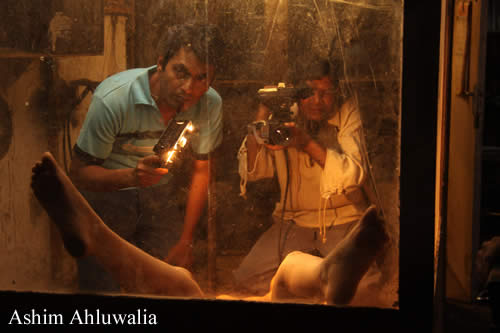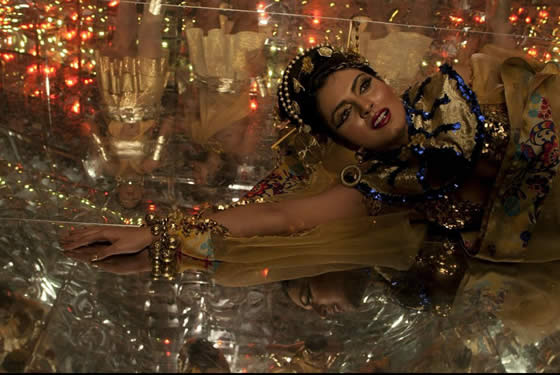 Miss Lovely, directed by Ashim Ahluwalia is a 2012 Indian drama film directed by Ashim Ahluwalia and set in the criminal depths of Mumbai’s C-grade (horror and porn film) industry. Ahluwalia’s debut feature follows the story of the Duggal brothers who produce sleazy sex-horror films in the mid-1980s. The plot explores the intense and mutually destructive relationship between younger sibling Sonu Duggal, played by Nawazuddin Siddiqui, and his elder brother, Vicky (Anil George). Sonu finds himself drawn to a mysterious young woman named Pinky (Niharika Singh) eventually leading to his downfall. The film has received the National Film Award – Special Jury Award (Feature film) and Best Production Design at the 61st National Film Awards.
Miss Lovely, directed by Ashim Ahluwalia is a 2012 Indian drama film directed by Ashim Ahluwalia and set in the criminal depths of Mumbai’s C-grade (horror and porn film) industry. Ahluwalia’s debut feature follows the story of the Duggal brothers who produce sleazy sex-horror films in the mid-1980s. The plot explores the intense and mutually destructive relationship between younger sibling Sonu Duggal, played by Nawazuddin Siddiqui, and his elder brother, Vicky (Anil George). Sonu finds himself drawn to a mysterious young woman named Pinky (Niharika Singh) eventually leading to his downfall. The film has received the National Film Award – Special Jury Award (Feature film) and Best Production Design at the 61st National Film Awards.
Bijan Tehrani: Your film Miss Lovely is a very interesting and also a very unusual film, please tell us about your approach to making Miss Lovely and about what motivated you to make this film.
Ashim Ahluwalia: I think you are right, in the sense that I don’t fit in any clear category of the Indian cinema, there are two sides to Indian cinema, there is the commercial Bollywood cinema and then there is the art house cinema which has traditionally more rural stories and I think what I was interested in was making a new space for myself and create some hybrid relationships between all of the different genres. Everyone is so concerned with staying in their own space but cinema is such a dynamic space and there is so much synergy between horror films and experimental cinema, so many of the genres can just collapse within one another, it can also become very meditative and very dark, so these juxtapositions make cinema feel very alive and lets us know that we are not doing the same thing over and over again.
BT: The genres are melted so well together, how did you manage this in your film?
AH: I think that is interesting that you phrased it that way because normally people cannot put their finger on what it is that they are feeling, but it is precisely that, it is multiple films crushed together and it creates this hybrid experience and it is very artificial and very traditional and it can feel like a studio movie and then falls apart like a documentary and become very raw and chaotic. I was always interested in what those genres did for the audiences and finding the connections and the trap doors to go from one genre to the other and there is seamlessness happens so it is kind of almost using a slight of hand trick when you are moving from one genre to other. In the final scene you go from a realistic and violent scene, where the characters shirt is covered in blood and then you follow him into a studio where everyone is in costume and then you can’t recognize him because he might be another person in costume.
BT: This film was clearly influenced by so many filmmakers and this is what makes it such an exciting and interesting film at a time when everyone is trying to be so conservative.
AH: My problem which is why I am so concerned as someone who loves film is about the genuine death in the excitement of cinema is that all of these original ideas that were at one point very interesting genres have been canonized and frozen and now you recognize that these auteur, so you see an Ozu type film, you will see a Sam Pollock film and these things that were individual moments in directors moments, Art House film to me is no different in genre like a music, for me I find that this is the way to kill cinema by never working with what this medium can provide for the future; sometime I will watch art house cinema and wonder why I won’t watch a  similar film that came out years before, so I find this style of filmmaking very boring in a way.
similar film that came out years before, so I find this style of filmmaking very boring in a way.
BT: How did you go about casting the film?
AH: The film actually started as a documentary, so I spent a year and a half trying to make this documentary and no one wanted to be on camera, so it was difficult, so I took all of those stories and all of these ideas and I fictionalized it and it was actually from gossip and narratives that I heard, so I then approached all of these people from the industry and told them that I was no longer making a documentary but a movie and if they would act in it and they all said yes. So I actually cast all of the same people from the industry to just play them, so a lot of those are non-professionals. The main character was a trained actor, the elder brother was someone that we actually found on the street who was a performer, so we casted unique people from the film industry, so they love to perform and they gave very realistic performances. They were scenes where solo fights with the director and that actually was a real moment, Solo was a trained actor and he resented that he had to perform with people that he felt was beneath them, so we filmed it like a documentary and kept the fight in the film.
BT: Do you have any future projects lined up?
AH: Just working on a bunch of different things in different parts of the world, we have one film in India and there is a film in Italy as well, a 16th century biopic, but nothing concrete yet.

